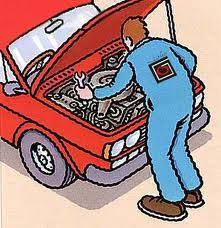
Nature of work
A small engine mechanic inspects, services, and repairs motorized power equipment. He/she often specializes in one type of equipment, such as motorcycles, motorboats, or outdoor power equipment. He/she discusses equipment issues, maintenances plans, and performance with customers. Also, he/she performs routine engine maintenance, tests and inspects engines for malfunctioning parts, reassembles and reinstalls components and engines, and keeps records of inspections. He/she works on power equipment ranging from snowmobiles to chainsaws. When equipment is broken down, he/she uses many strategies to diagnose the source and the extent of the problem. He/she determines mechanical, electrical, and fuel problems and makes necessary repairs.He/she uses a variety of hand tools, including screwdrivers, wrenches, and pliers, for many common tasks.
The following are types of small engine mechanics:
Motorcycle mechanics: specialize in working on motorcycles, scooters, mopeds, and all-terrain vehicles.
Motorboat and marine equipment mechanics: maintain and repair the mechanical and electrical components of boat engines.
Outdoor power equipment mechanics: service and repair outdoor power equipment, such as lawnmowers and garden tractors.
Environment of work
A small engine mechanic generally works in well-ventilated but noisy repair shops. He/she sometimes makes onsite repair calls, which may require working in poor weather conditions. When repairing inboard engines and motorboat mechanics, he/she may work in cramped and uncomfortable places. She/he works full time during regular business hours. Most mechanics are very busy during spring and summer when working on equipment, such as lawnmowers and boats, is highly demanded. During the peak seasons, many mechanics work considerable overtime hours. In contrast, some mechanics are not busy during the winter, when demand for small engine work is low. Many employers, however, schedule major repair work to be performed during the off-season, to keep work consistent. While performing the duties of this job, the employee regularly works near moving mechanical parts. The employee is frequently exposed to humid conditions, fumes or airborne particles, toxic or caustic chemicals. The employee is occasionally exposed to risk of electrical shock. The noise level in the work environment is moderately loud. Professional life
Employment of motorboat mechanics is expected to grow 21 percent, faster than the average for all occupations. Although the retail boat industry, the primary employer of motorboat mechanics, has consolidated in recent years. Demand for repair services is expected to rise as boat engines become increasingly sophisticated. Employment of outdoor power equipment mechanics is expected to grow about 19 percent as fast as the average for all occupations. Demand for repair services is expected to rise as outdoor power equipment becomes more complex. Most new jobs could be in the industries that are related to lawn and garden care, in which small engine equipment is frequently used. Job opportunities are expected to be very good for candidates who have formal training. Those without formal training can expect to face strong competition in jobs.Range of typical starting salaries: 35000 SYP plus potential bonuses.
Getting the job
As motorized power equipment becomes more sophisticated, employers increasingly prefer to hire a mechanic who has completed formal training programs. However, many mechanics learn their trade informally. A growing number of motorcycle and marine equipment mechanics complete formal postsecondary programs in small engine repair. Employers prefer to hire these workers because they usually require significantly less on-the-job training. Because of the limited number of postsecondary programs, however, employers often have difficulty finding qualified workers. As a result, many mechanics begin work with a high school degree and learn the job. Some employers may hire applicants with less education if they have adequate reading, writing, and math skills. Trainees work closely with experienced mechanics while learning basic tasks, such as replacing spark plugs or disassembling engine components. As he/she gains experience, trainees move on to more difficult tasks, such as advanced computerized diagnosis and engine overhauls. Achieving competency may take from several months to 3 years, depending on a mechanic’s specialization and ability. Skills
There are many skills she/he needs to have and tries to improve, such as:Customer-service skills, he/she should be courteous, good listeners, and ready to answer customers ‘questions.
Dexterity, Many tasks, such as disassembling engine parts, connecting or attaching components, and using hand tools, require a good steady hand.
Mechanical skills, he/she must frequently disassemble major parts for repairing and be able to reassemble them properly.
Technical skills, he/she must be familiar with electronic control systems and the tools needed to fix and maintain them.
Troubleshooting skills, he/she should be able to repair increasingly complicated mechanical and electronic systems.
Sources and references
If you need any further information on what is included in this file, you can visit the following websites: The Order of Syrian engineers, Damascus, Tel: 6627256
www.arab-eng.org, Arab Engineers Forum.
Arab Standard Classification of Occupations, 2008, Ed. Arab Labor Organization.
